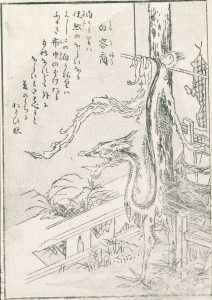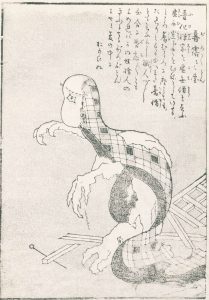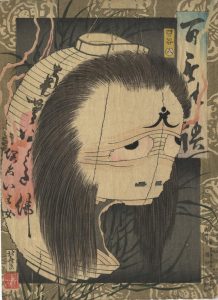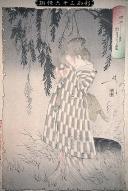In the previous article we looked at yokai that live in specific regions and yokai that only appear at designated places and/or times. This time we’ll briefly explain everyday items that turned into yokai called tsukumogami*1 (tool ghosts and monsters) and yokai that were brought to life in stories.
Even Everyday Items Can Possess Souls and Become Yokai
Among yokai, there are some that were brought into existence based on the belief in Animism within Japan. Tsukumogami, one type of such yokai, are said to come into being when souls are possessed by or spirits lodge in everyday items. Since ancient times, people in Japan have believed that souls and spirits dwell in all things. But in particular, things that have been lovingly used over a long period of time are believed to become tsukumogami. A dust cloth used to the point it ends up tattered with long strips of fabric hanging down turns into a Shiro-Uneri (White Billow); springing back to life with the movements of a dragon. A quilt that has been patched over and over and yet the cotton batting still protrudes from miserable openings will one day rise up and become a Boroboroton (Tattered Quilt). If you want to meet tsukumogami you should make sure to take good care of everyday items and have them repaired whenever needed as you continue to use them for a long, long time.

(Image: National Diet Library Digital Collections)

(Image: National Diet Library Digital Collections)
Yokai Brought to Life in Stories
Of course we can’t forget the yokai that crawled into our world in kaidan (ghost stories) sure to send shivers down your spine. Each and every one carries a story filled with immense sorrow. First, let’s look at the appearance of Chochin Oiwa (Lantern Oiwa) in Tokaido Yotsuya Kaidan (Yotsuya Ghost Story), a kabuki play from the Edo Period (1603–1868) written by Tsuruya Nanboku. The betrayal of her husband, Tamiya Iemon, led to the loss of Oiwa’s life but left her brimming with such intense resentment that she haunted a lantern. When you look at the painting below you can clearly see the contortions of indescribable bitterness that consumed her. Moreover, there is often some confusion with Okiku in the anecdote of Banshu Sarayashiki (The Dish Mansion at Banshu) as they both came into existence in Edo Period and have similar names. Okiku worked at a mansion in possession of a valuable collection of 10 dishes. After being falsely accused of breaking one of the dishes she threw herself into the well. As night falls, a voice can be heard repeatedly counting the dishes in despair. “One’s missing!” the voice laments. These yokai have continued to fill humans with a sense of horror since the Edo Period, and now they have finally obtained the power to appear in the present world.

(Image: International Research Center
for Japanese Studies)

(Image: International Research Center
for Japanese Studies)
We hope you enjoyed that and have been able to learn a little something to spark your interest in the yokai we have feared for so long and yet continue to coexist with. The quickest way for yokai to be able to exist without having to conceal themselves from humans is for us to understand more about them and to embrace our fears.
In this serialized feature we have put the spotlight on these yokai to introduce them to all of you. Who knows what yokai might appear before you when you cherish the excitement you would feel if you were reaching for the door at the haunted house.
[Footnotes]
*1 Tsukumogami is written as “付喪神” or “九十九神” in kanji.
*2 Indicating the belief that souls and spirits dwell in all things.
*3 There is a tale called “Banshu Sarayashiki” (The Dish Mansion at Banshu) from Himeji in Hyogo prefecture and another tale called “Bancho Sarayashiki” (The Dish Mansion at Bancho) from Akasaka in Tokyo. We are referring to the legend of Sara Kazoe (Counting the Dishes) from Toriyama Sekien’s Gazuhyakkiyako.
[Reference]
Ehon Hyakumonogatari—Tosanzin Yawa—, Takehara Shunsen, Kokushokankokai,1997.
Gazuhyakkiyako, Toriyama Sekien, Kadokawa Sophia Bunko, 2005.
Zusetsu Nihon Yokai Taizen, Shigeru Mizuki, Kodansha+α bunko, 1994.
Yokai.com, October 17, 2019.
We are accepting applications for writing tourism and cultural articles in Japanese and/or English, multilingual translations and other services. For inquiries, please contact us:
Tel: (+81) 3-6902-9030
Email: info@omega-com.co.jp
Note: Unauthorized copying and replication of the contents of this site, text and images are strictly prohibited. All Rights Reserved.
